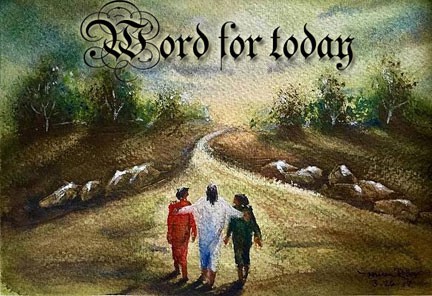Watch
Events
Articles
Market
More
As we are approaching a new month, which means we have this coming months bills to worry about. Everyone has been really helpful so far, and without everyone's assistance we wouldn't have gotten this past month's bills taken care of. We're appreciative of everyone, whether financial aid, or prayers, or both. You guys are awesome, and I pray you're blessed for your support 🙏🏻
https://givesendgo.com/dustinh....all?utm_source=share
https://venmo.com/code?user_id....=4184742471665217710
https://cash.app/$RemnantHeart
https://www.paypal.me/HallLink



Thought for Today: Thursday October 30
Instead of giving YHVH His rightful place at the centre of our lives, we have substituted the “god” of self. Only the Moshiach can change our hearts – and through us begin to change our world. Does this mean we can never make any progress against the massive problems that assails us – poverty, war, injustice, famine, crime, sickness or disease? No, of course not; YHVH wants us to fight evil wherever it is found. But our greatest need is for repentance and spiritual renewal.



You may call Yeshua your Savior, but is He your Lord? In the first of a four-part series of recorded messages, Steve asks and answers this question. All of Israel was delivered (saved) from Egypt. However, does this mean He was Lord to all of Israel? Now more than ever it’s essential we honestly consider where we land on this topic.
https://torahfamily.org/our-savior-our-lord/



It's hard to love someone if we don't know what love is. So what exactly is love? That's the question David Jones and Barry Phillips try to answer.
https://www.buzzsprout.com/229....2194/episodes/176920



It's hard to love someone if we don't know what love is. So what exactly is love? That's the question David Jones and Barry Phillips try to answer.
https://www.buzzsprout.com/229....2194/episodes/176920



In the days of Amraphel king of Shinar, Arioch king of Ellasar, Chedorlaomer king of Elam, and Tidal king of Goiim...
Genesis 14:1
Many skeptics will tell you that the Bible is false because it contains many names that don't appear in extra-Biblical sources, but archaeologists and historians keep proving them wrong. They're desperate to disbelieve. Real history tells us that all of these names are likely to show up on a cuneiform tablet or stone inscription somewhere. Like the Hittite Empire, the walls of Jericho, and the house of David did when they used to say those where just myths.



...strengthening the souls of the disciples, encouraging them to continue in the faith, and saying that through many tribulations we must enter the kingdom of God.
Acts 14:22 ESV
Entering the Kingdom is a commitment to an arduous trek, not a short, easy prayer. And hardships are necessary for maturity. See 1 Corinthians 3:12-13.



Many people who choose to trust our Creator at some time question the traditions that are practiced. Most simply accept these traditions because they have been practiced for centuries and yet a very few will acknowledge the pagan origins of them. Everyone who chooses to reject these traditions and replace them with the way that our Creator chooses to be worshipped does so for their own reason. One popular reason is “what I heard the pastor preach isn’t what I read in the Bible.” Deuteronomy 12:4, “You shall not worship the LORD your God in this way.” This verse sums up the use of traditions that separate us from our Creator.



102925 / 6th day of the 8th month 5786
WORD FOR TODAY “the LORD does not change”: Mal 3:6 "For I, the LORD, do not change; therefore you, O sons of Jacob, are not consumed. Mal 3:7 "From the days of your fathers you have turned aside from My statutes and have not kept them. Return to Me, and I will return to you," says the LORD of hosts. "But you say, 'How shall we return?'
WISDOM FOR TODAY: Pro 21:2 Every man's way is right in his own eyes, But the LORD weighs the hearts.
Ask the LORD how you can serve HIM better
www.BGMCTV.org



